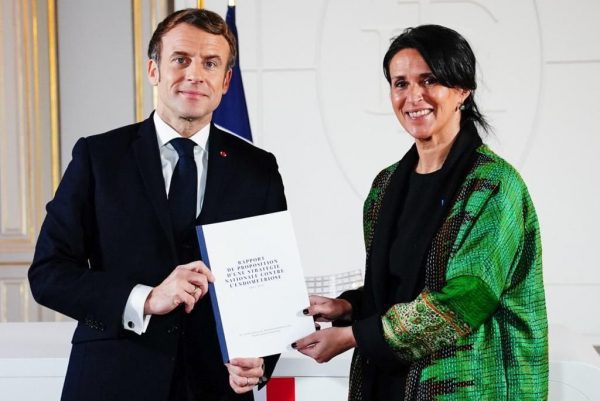Nigeria’s 2024 Budget: Prioritizing Security, Job Creation, and Poverty Alleviation.
In a bid to wriggle Nigeria out of the economic and social morass it is currently enmeshed in, security, job creation and poverty reduction are the top-priority matters in the renewed hope agenda of the President Bola Ahmed Tinubu administration for next year.
These three critical areas are the target primes in the N27.5 trillion budget for the 2024 financial year christened: “Budget of Renewed Hope”, laid before a joint session of the National Assembly yesterday by the president.
Tinubu told the federal lawmakers that national defence and internal security, local job creation, macro-economic stability, investment environment optimisation, human capital development, poverty reduction, and social security are some of the top priorities of 2024.
While presenting the vudget, he said the removal of subsidy by his administration was harmful to the economy.
LEADERSHIP reports that of the N27.5 trillion, the non-debt recurrent expenditure is pegged at N9.92 trillion and debt service is projected at N8.25 trillion while capital expenditure gets N 8.7 trillion.
The budget is based on parameters such as oil price benchmark of $77.96 per barrel, daily oil production estimate of 1.78 million barrels per day and exchange rate of N750 per $1 for 2024.
Tinubu told the Senators and members of the House of Representatives that Nigeria remains committed to meeting its debt obligations, hence a debt service is 45% of the expected total revenue is projected.
The president said, “It is, by now, a matter of recorded history that my very first fiscal intervention as President of this great nation was to end the fuel subsidy regime, which had proven to be so harmful to the overall health of our national economy.”
According to him, the budget deficit is projected at N9.18 trillion in 2024 (3.88 percent of GDP), lower than the N13.78 trillion deficit recorded in 2023 which represented 6.11 percent of GDP.
Tinubu said the deficit will be financed by new borrowings totalling N7.83 trillion; N298.49 billion from privatisation proceeds and N1.05 trillion drawdown on multilateral and bilateral loans secured for specific development projects.
The president in his address said national defence and internal security, local job creation, macro-economic stability, investment environment optimisation, human capital development, poverty reduction, and social security are some of the top priorities of 2024.
Tinubu said the nation’s internal security architecture will be overhauled to enhance law enforcement capabilities with a view to safeguarding lives, property, and investments across the country.
He said the proposed budget prioritizes human capital development, with particular attention given to children, because human capital remains the most critical resource for national development.
President Tinubu said his administration remains committed to broad-based and shared economic prosperity, adding that “We are reviewing social investment programmes to enhance their implementation and effectiveness. In particular, the National Social Safety Net project will be expanded to provide targeted cash transfers to poor and vulnerable households.”
He also said efforts will be made to further contain financial leakages through the effective implementation of key public financial management reforms.
The president commended the patriotic resolve of the 10th National Assembly to collaborate with the Executive on the mission to renew the hope of Nigerians and deliver on the promises made to Africa’s largest population.
On his part, Senate President Godswill Akpabio who is also the chairman of the National Assembly said in their people-focused legislative agenda, the National Assembly places a strong emphasis on national security, recognizing it as a cornerstone for progress.
Akpabio noted that the security challenges demand a united front, adding that they remain steadfast in their determination to work collaboratively with the executive to address and overcome the security challenges confronting the nation.
“In this National Assembly, the death of any Nigerian equates to a loss of a constituent. So whenever we lose anyone to insecurity, it is the sound of the ambulance passing by our window. We believe that insecurity can and must be stopped and it must be stopped by all Nigerians rallying around and supporting the Government’s efforts. We also want to seize this opportunity to appreciate our Armed Forces for fighting for us and sometimes paying the supreme sacrifice for us,” he said.
In his vote of thanks, Speaker of the House, Abbas Tajudeen, proposed enacting a Budget Act to strengthen the budget process and promote development outcomes, saying it is a well-established practice in democracies across the world.
Abbas said the National Assembly will support the government’s policies and programmes targeted at alleviating poverty, economic restructuring and diversification, as well as general social sector reform and development.
Meanwhile, the federal government has said it would prioritise three key sectors – defence, education and health – to drive its renewed hope agenda in a bid to revamp the economy currently challenged by many domestic headwinds, including high inflation, supply chain distribution and controversial fuel subsidy removal.
A breakdown of the 2024 proposed budget by the minister of Finance and coordinating minister of the Economy, Wale Edun, showed that N3.25 trillion was allocated to defence and security sector; education got N2.18 trillion or 7.9 percent, while N1.33 trillion (five percent of federal budget) was allocated to health.
The 2024 federal revenue is projected at N18.32 trillion (N7.28 trillion or 66 percent more than the 2023 Budget).
Of the aggregate revenue, N7.94 trillion or 43.3 percent is projected to come from oil-related sources, while the balance of N10.39 trillion is to be earned from non-oil sources.
The budget deficit is projected to be N9.18 trillion in 2024, N4.6 trillion down from N11.60 trillion budgeted in 2023. The proposed deficit represents about 50 percent of total national revenues and 3.88 percent of the estimated GDP.
“The high projected level of fiscal deficit in 2024 is partly attributable to the proposed salary review of Federal workers across board, increased pension obligations and higher debt service cost,” Edun said yesterday at the presentation of the budget breakdown in Abuja.
At 3.88 percent, the projected level of deficit is higher than the 3 percent threshold stipulated in the Fiscal Responsibility Act (FRA), 2007. FRA 2007 however allows the government to exceed the 3 percent threshold if justified by threats to national security.
The provisions of N8.25 trillion and N243 billion were made for debt service and sinking funds to retire maturing bonds issued to local contractors/creditors respectively.
A total of N6.48 trillion (inclusive of N1.02 trillion for government owned enterprises) is provided for personnel and pension costs, an increase of N576.16 billion or 9.8 percent over the 2023 provision. This is 35.4 percent of the projected aggregate revenues for 2024.
The aggregate amount available for capital expenditures in the 2024 budget is N8.70 trillion, higher than the 2023 provision of N8.43 trillion.
Addressing the media and other stakeholders at the presentation, Edun said the government will make efforts to further contain financial leakages through effective implementation of key public finance management reforms.
“The goal of fiscal interventions will be to further stimulate the economy through carefully calibrated regulatory/policy measures designed to boost domestic value-addition, de-risk the enterprise environment, attract external investment and sources of funding, etc.Government remains mindful of the need to provide safety nets to cushion the impact of reform measures on the vulnerable segments of the population,” he said.
The minister said passage of the Budget for implementation from January 1 will significantly contribute towards achievement of government macro-fiscal and sectoral objectives.
Performance Of 2023 Budget
The minister also disclosed that as of September 2023, federal government’s retained revenue was N8.65 trillion, approximately 104.5 percent of the prorata target of N8.28 trillion.
The aggregate expenditure for full year 2023 (inclusive of the supplementary budget) is estimated at N24.82 trillion, with a prorata spending target of N18.62 trillion at end of September. The actual spending was N12.7 trillion.
Of this amount, N5.79 trillion was for debt service, and N3.78 trillion for personnel costs, including pensions, according to the minister.
The government share of oil revenues was N1.42 billion (84.7 percent performance), while non-oil tax revenues totalled N2.50 trillion (a performance of 135 percent). CIT and VAT collections were N1.55 trillion and N318.95 billion, representing 221.4 percent and 111percent of their respective targets.
The projected fiscal deficit for FY 2023 is N13.79 trillion, with a prorata deficit of N10.33 trillion at end of September. The actual deficit was N4.05 trillion, and was mainly financed by domestic borrowing.
Customs collections, made up of import duties, excise and fees, as well as federation account special levies, recorded N611.65 billion out of N837.59 billion (73 percent of target). Other revenues amounted to N4.74 trillion, of which independent revenue (mostly transfers from GOEs and MDAs) was N1.28 trillion.
PDP Asks NASS To Reject Budget
But the Peoples Democratic Party (PDP) described the N27.5 trillion budget for 2024 fiscal year as proposed by President Tinubu to the National Assembly as a huge disservice which, if passed, will further asphyxiate Nigerians and plunge the nation into more economic depression and hopelessness.
The PDP also described the claim by President Tinubu that the budget is a Budget of Renewed Hope as conjured and unfounded, adding that it is completely devoid of concrete mechanisms to revive the economy, create jobs, address the comatose manufacturing and productive sectors, human capital development deficiencies and depleting life expectancy of Nigeria citizens.
The party therefore called on the National Assembly to reject the 2024 budget as presented and use its legislative powers to disassemble the budget and make provisions that are critical and pivotal to the growth of the economy and the welfare of Nigerians.
Reacting to the budget presentation yesterday, the party’s national publicity secretary, Hon. Debo Ologunagba, said it is filled with heavily padded figures, duplicated items and several false statistics including claims of global increase in inflation rate as excuse for an impending excruciating increase in taxes and interest rate to the detriment of our productive sector.






![MUSIC: Shadow feat. Don One - A Kapta [Download Mp3] MUSIC: Shadow feat. Don One - A Kapta [Download Mp3]](/wp-content/uploads/2020/08/Akapta_mp3_Shadow_Don_One.jpg)





